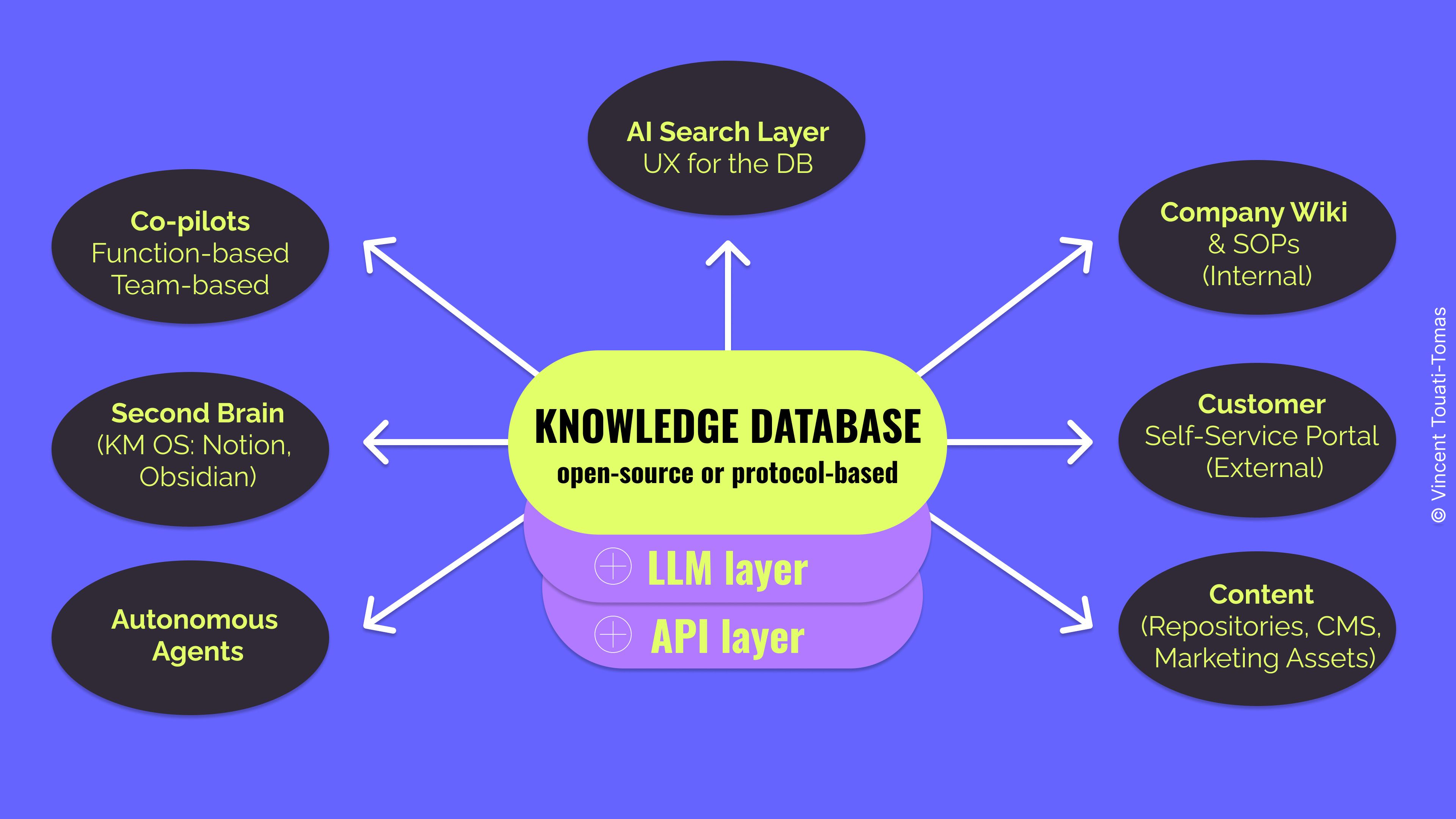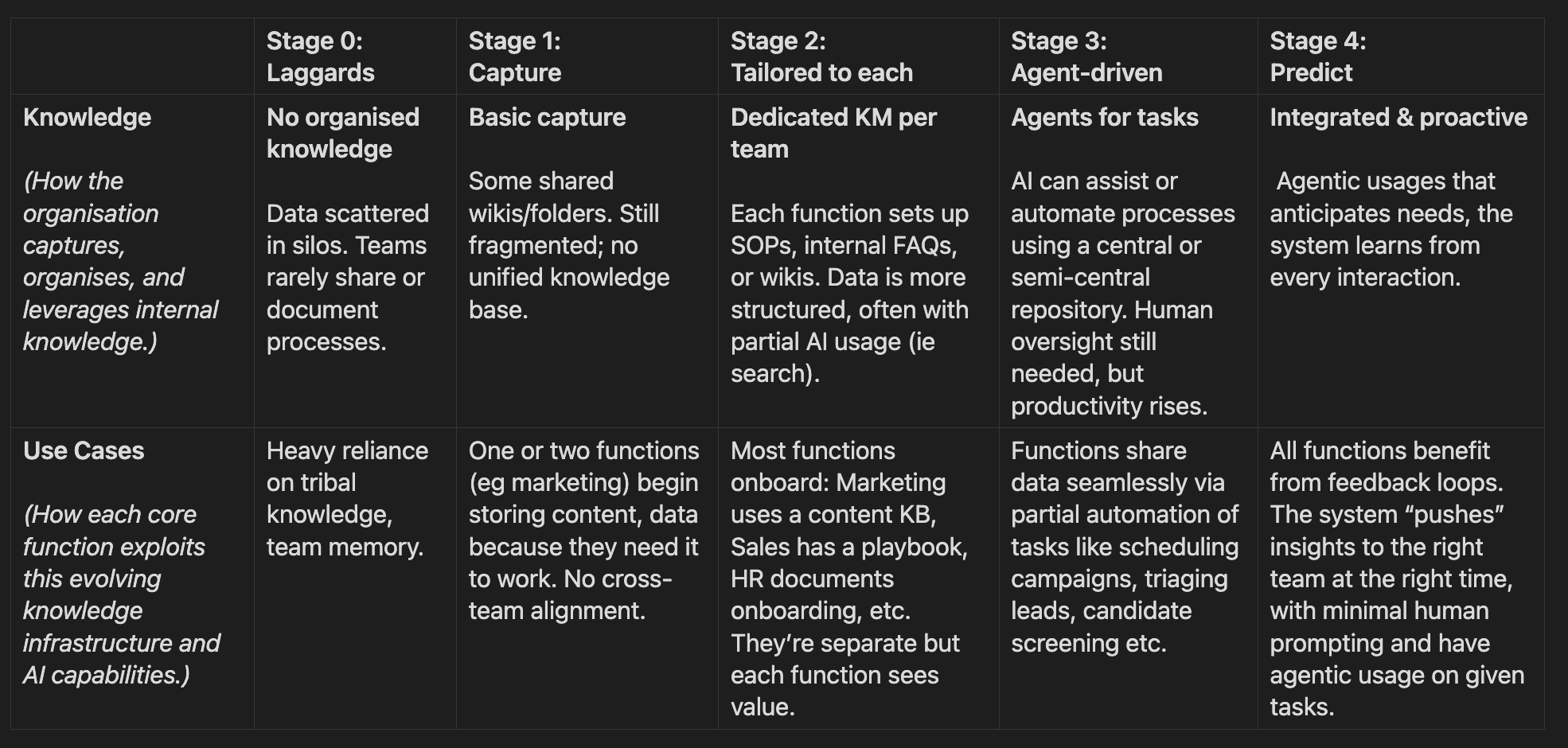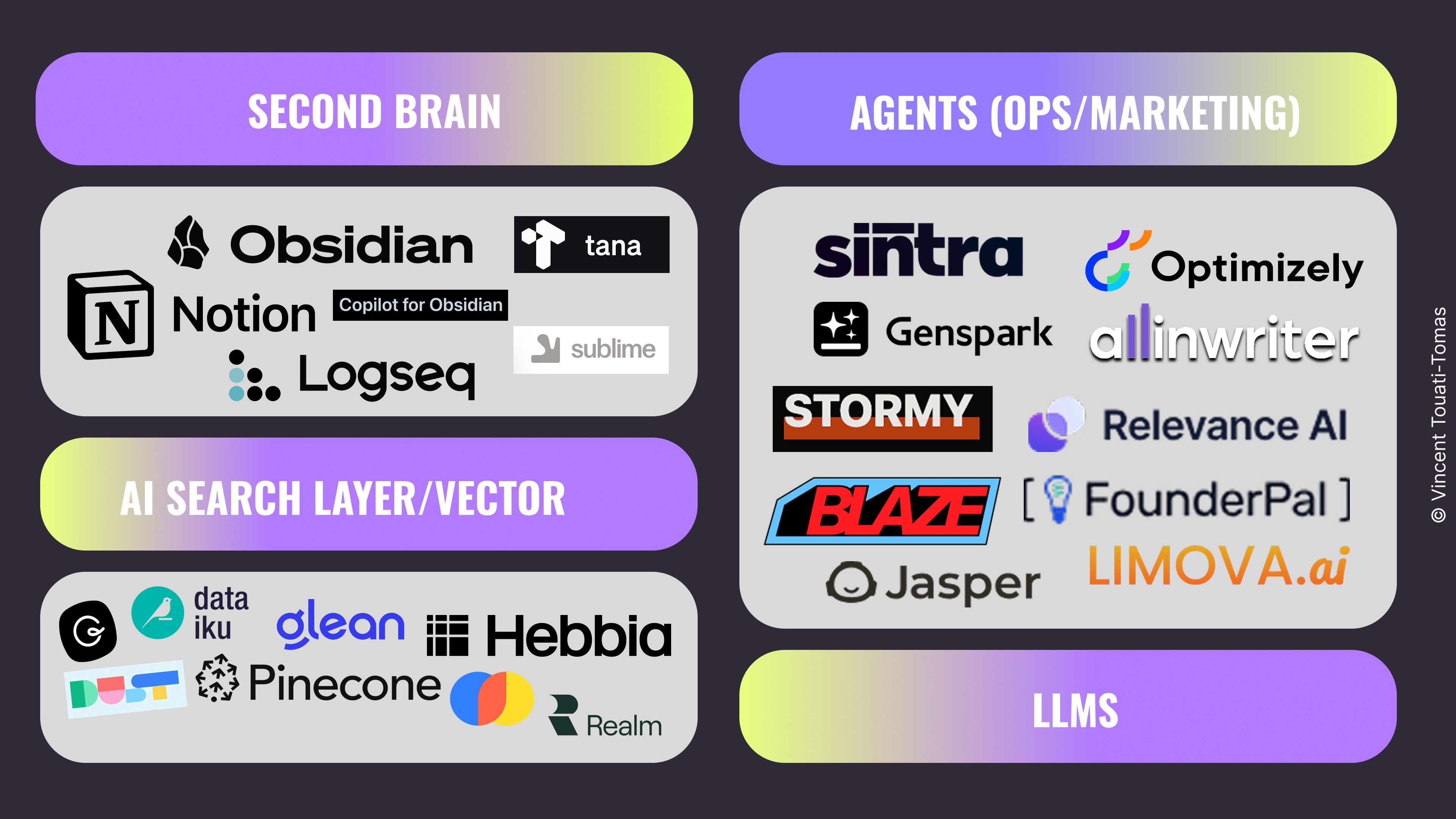Beyond AI tools: building a knowledge base business
There’s excitement in the air, the one that reminds me of the early blogging days when throwing up a new site from my bedroom felt like the next big thing. Except this time, we’re talking about the promise of automation for any task that fits into a prompt.
Yet I’m convinced the real revolution has less to do with AI tools and far more to do with how we store and harness knowledge. In a world where software gets commoditised overnight, owning your knowledge and treating it as a living product, beats relying on rented platforms.
Klarna is arguably one of the most advanced companies in the space, and famously saved $10 million annually with AI-knowledge-driven efficiency gains: they developed their own proprietary “Copy Assistant” handling 80% of marketing copy tasks, and have integrated AI “copilots” at every stage of its marketing workflow.
In this article, I want to dive into why building a knowledge base business (where a dynamic repository underpins every decision) is the single most important step to thriving in the AI era. I’ll define what this means, outline key market shifts, and give practical tips on structuring a robust knowledge base that ensures you’re ready for whatever agentic or automation wave comes next.
Market Context: what are strategists doing?
I've argued previously that all asset classes are converging. This convergence often occurs when something fundamental is broken and needs fixing, and in most cases it's productivity. Similar convergences of (different) asset classes occurred in the 1970s, 2000s, and 2010s, with a common thread each time: when companies struggled, strategy consultants thrived by selling productivity gains.
And during these periods, strategy becomes overnight a question of survival. Strategists are often riding the tide (because their business is highly dependent of having real solutions to implement), and because of that I pay attention to what strategists do at any given time.
And, right now they are booming.
Quietly, they implemented LLMs to handle a wide range of text-based tasks that were delegated to underpaid junior staff. They fired thousands, because there's no need for an army of underpaid MBA graduates to maintain operations.
And if it's true for strategists and all service providers, it's coming for marketing agencies, accountants and it's coming for your company. And as the fast-growth venture playbook has slipped into the mainstream business cycle, becoming a commodity, I believe strategist are just the tip of the iceberg.
Knowledge-base-powered businesses will really dominate the world in a few years time.
Defining the “Knowledge Base Business”

There are plenty of ways to run a company but why should you care about your knowledge base? Let’s call it AI-Ready Knowledge Base Business for clarity: a structure that doesn’t merely document processes but uses a living repository as the nerve centre for everything from product decisions to marketing campaigns. In marketing terms this is very close to the narrative document ruling every prompt (see: crafting and managing your narrative).
Think of it as the next evolution of SOPs. But this knowledge isn’t static. It’s constantly revised, informed by real-time feedback from the field.
We’ve all worked at places that distribute a clunky .pdf with “how we do X here.” Within weeks, it’s out of date. Within months, employees ignore it.
A knowledge base business, by contrast, is constantly refined: each new customer engagement, each product iteration, yields lessons that are fed back in, producing a virtuous feedback loop of improvement.
This knowledge base system is:
- Scalable: Built on open source formats and protocols (like Markdown) that can grow with your organisation and be programmatically accessed
- Transferable: Not locked into proprietary systems that limit your ability to adapt as technology evolves
- Enriched: Constantly refined and improved by senior talent with deep expertise
- Living: Updated continuously through feedback loops from real-world application
- Accessible: Available to both humans and AI systems with appropriate context
- Reliable: Trusted as a source of truth for the organisation
Why knowledge beats tools
Tools matter, but never in the long term. Think of an AI marketing platform. You can swap from ChatGPT to Claude to an open-source LLM with minimal friction, provided you have well-organised data, frameworks in place and a stellar positioning. If you don’t have these ingredients, the new tool will simply produce half-baked output (see: garbage in, garbage out).
Let's take beloved Notion: fantastic user experience, collaborative features, and templates. But it can also lock you into a narrower path, forcing you to use specific AI models (like GPT-3.5) because it’s cheaper for the platform to implement. Even if you want more advanced models, you find yourself stuck. Or more anecdotally, have you tried copy-pasting a text from Notion to a Google Docs? Adding any AI layers on top? Nice thought. It's clear that data is Notion's, not yours.
Consider how many onboarding documents are never updated because they exist in scattered databases or, worse, as static PDFs?
In most companies, circulation of information is largely dependant on people and its leadership team rather than processes. This is a threat in the age of AI. Anyone, anything, should be able to log into the company OS and execute tasks, refine knowledge and build feedback loops.
Some advanced organisations (working with multi-models for memory, planning, and causal reasoning) are pushing further into agentic use cases. However, these remain in early phases, and I have yet to see any breakthrough implementations of these so-called agents. Procurement and compliance cycles also suggest it could take years before large enterprises fully embrace these technologies. Startups may be better equipped to ride this wave if they implement strong foundations first. But the incumbent's advantage lies in their capacity to capture and organise information and data.
It's also important to clarify what we mean by "agents," as the term is often misused:
- Automations execute predefined, rule-based tasks (CRMs, Zapier, N8N)
- AI workflows use LLMs for specific steps in otherwise deterministic processes (Enrichment, Sintra)
- True AI agents perform non-deterministic tasks autonomously (?)
While all have their place, businesses are now discovering that reliable knowledge foundations improve the performance of each approach. To put this anecdotally, ChatGPT will not replace the top 1% at McKinsey, but McKinsey has the top 1% knowledge to prompt it.
Below is how I see the different adoption stages of this new trend and how to asses where you sits in this roadmap.

Practical implementation
With that in mind, company CEOs should treat their knowledge base as a living product with dedicated owners, improvement sprints, retrospective sessions to gather new insights, and mechanisms for all staff to suggest edits.
- Context is everything: When you integrate AI systems with your knowledge base, you provide them with the specific context they need to deliver relevant insights rather than generic responses.
- Leverage senior people. Your senior staff or domain experts are the keepers of vital knowledge. It's their job to shape the knowledge base. With a user-friendly environment, they should be able to execute on it and leverage your unique hedge.
- Add tools thoughtfully. Do you need a fancy AI model to generate marketing plans automatically? Perhaps. And yes you probably think you can remove your marketing team altogether. But first, check that your knowledge base is robust enough to supply the required context for any agentic/automation use case.
- Build a continuous feedback loop. In i) marketing for campaigns ii) customer support to build Q&A snippets evolve into a resource that AI or human agents can tap for queries iii) product so that your roadmap is always informed by real data.
- Beware of pitfalls. History has often warned us: once humans outsource too much of their thinking, they risk losing vital skills. Socrates raised the same alarm about the invention of writing, it would “introduce forgetfulness into the soul.” If your team rely too heavily on AI to organise their thoughts, your company will stagnate. Keep humans in the loop: AI can do much of the heavy-lifting, but your people should still drive the interpretation and final decision-making.
Tooling: a market map for knowledge base businesses
In all transparency, I run my advisory business almost exclusively using Obsidian co-pilot, N8N and a bunch of LLMs and increasingly implement similar systems in small companies. But for companies with more than 10 people, local-based software is simply not good enough as collaboration features are very limited. Developing custom made solutions is often out of reach.
I've tried to compiled a map of the knowledge-base tools available on the market to help you get off the ground.
 Knowledge Base Tools & Agents Market Map
Knowledge Base Tools & Agents Market Map
AI will continue to brings new frameworks, new agentic capabilities, and new use cases.
For entrepreneurs, the choice is clear: invest in building your knowledge base now. Don’t wait. Treat it as a product in its own right, something that deserves versioning, user feedback, and continuous improvement. You’ll find yourself well-prepared for the next big wave in AI, whether that’s genuine autonomous agents or more sophisticated workflows - who knows what's next!
Don't fixate on the newest tool to implement.
Your knowledge base is your moat.